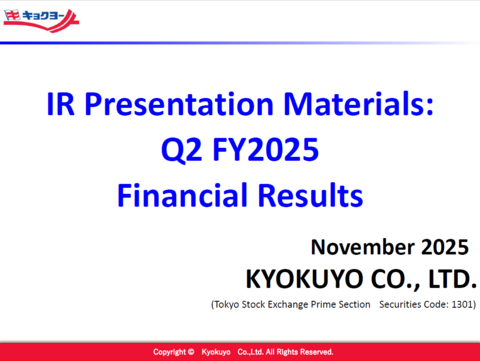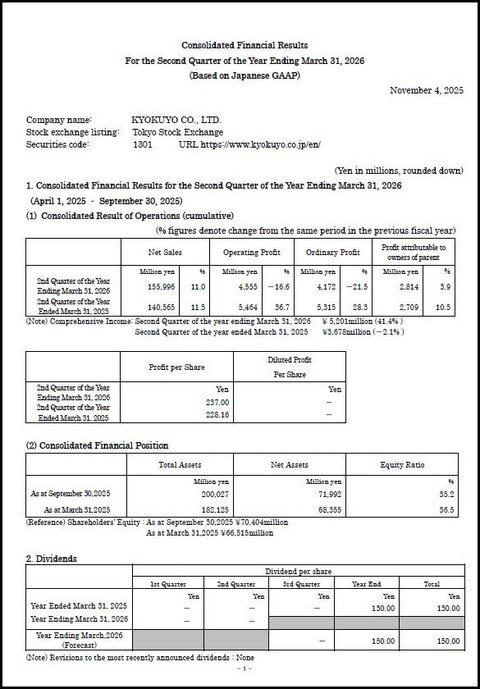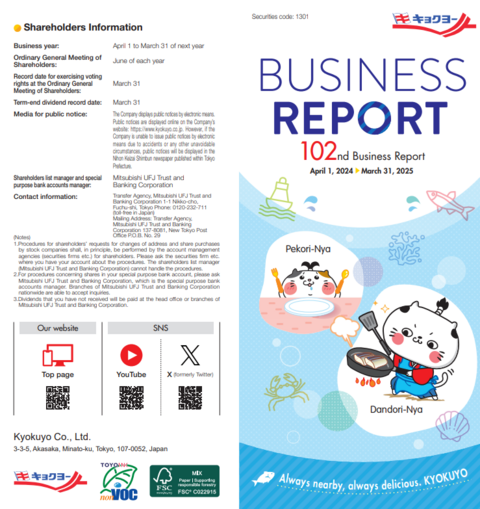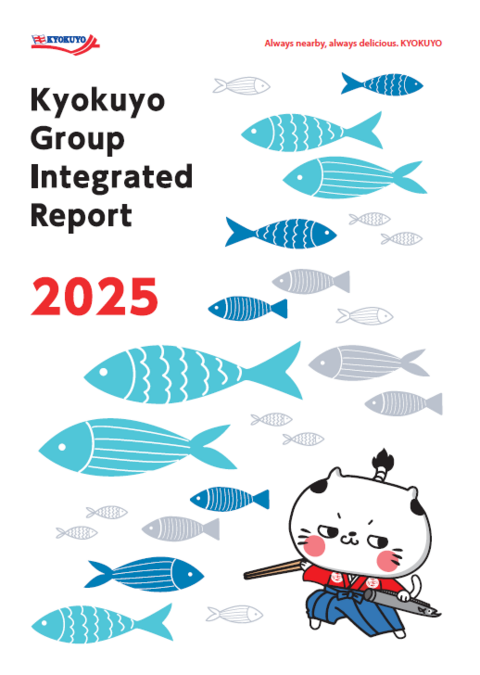This website uses cookies for a better browsing experience.
If you agree to the use of cookies, please click the "Agree" button.
Please refer to the Privacy Policy regarding the use of cookies on this site.
Basic Concept of Corporate Governance
The basic policy for corporate governance at Kyokuyo and its group companies is to conduct highly transparent management for all of our stakeholders including shareholders and conduct swift and decisive decision making in order to achieve sustainable growth and improve our corporate value in the medium to long-term.
We also comply with our Corporate Philosophy and Group Corporate Action Charter to build appropriate systems for monitoring and supervision in order to ensure compliance, and strive to maintain the efficiency and fairness of management.
Corporate Governance System
【1】Board of Directors
We periodically and provisionally hold Board of Directors meetings as the basis for a system for ensuring that the duties of the board of directors at Kyokuyo and its group companies are efficiently carried out.
In order to clarify the management responsibilities of directors and establish a management system that can swiftly respond to changes in the management environment, we set a one year term of office for directors and appoint four external directors.
【2】Board of Auditors
Kyokuyo has adopted an auditor system. Two of our three auditors are external auditors, who work to enhance the supervision of our managers.
Auditors survey the operational status of management and internal control such as internal checks, compliance, and internal audits according to the auditing policy and auditing plan formulated by the Board of Auditors at the start of the fiscal year, and conduct audits that focus on confirming their efficiency.
【3】Nomination and Remuneration Committee
Kyokuyo has adopted an optional Nomination and Remuneration Committee as an advisory body for the Board of Directors. The Nomination and Remuneration Committee shall be made up of three or more members, of which the majority shall be independent external directors. The Nomination and Remuneration Committee receives inquiries from the Board of Directors, deliberates topics such as the nomination and compensation of directors, and reports to the Board of Directors.
【4】Reason for Adopting the Current System
As indicated above, our directors serve for one year, and we have established a management system that can swiftly respond to changes in the management environment and clarified the management responsibilities of directors. We also ensure supervision by external directors and auditing by external auditors, and promote the active exchange of opinions from external directors in Board of Directors meetings in order to receive various suggestions on the management of the company, as well as maintaining a system to ensure that management monitoring functions appropriately.
【5】Status of Maintaining Internal Control System
Based on a basic policy for internal control systems, we maintain a compliance system across the entire group and have established an Audit Dept led by the board member in charge of compliance, which promotes concrete measures to build, maintain, and improve the compliance system,
We also maintain an internal reporting system within the group that enables informants to directly report to the internal department head in charge of compliance and an external law office regarding legal violations and other compliance incidents, which is operated based on rules for protecting informants.
The Board of Directors is notified of the results of reports via the director in charge of compliance, and we maintain a system to ensure that informants are protected.
【6】Status of Maintaining Risk Management System
We have created basic risk management rules for the Kyokuyo Group and maintain a risk management system for the comprehensive and inclusive management of risk across the entire group.
An Sustainability Commitee led by the president also builds, maintains, and continues an environmental conservation system for the entire group. In regard to quality safety risks, we have created Food Defense Guidelines that are operated as the basis for plant administration.
When food incidents occur, the entire group swiftly responds based on rules regarding the handling of food incidents and dealing with complaints, etc.
Kyokuyo and its group companies have formulated a business continuity plan (BCP) to handle the risk of disasters, and maintain a system that enables business to continue even in the event of a disaster.
An Internal Audit Team audits the risk management system of Kyokuyo and its group companies and reports the results to the Internal Audit Committee.
Status of Auditing
【1】Auditor Audits
Kyokuyo auditors comply with standards on auditor audits defined by the Board of Auditors and follow the auditing policy and allocation of duties, etc. to communicate with directors, the Internal Audit Department, and other employees, etc. in order to gather information and maintain an auditing environment, while also attending Board of Directors meetings and other important meetings, receiving reports on the status of the execution of duties from directors and users, etc., and requesting explanations and viewing important approval documents when required, in order to survey the situation of work and finances at the head office and other main offices.
Auditors also communicate with the directors and auditors at subsidiaries, exchange information, and receive reports on business from subsidiaries as required. Furthermore, auditors periodically receive reports from directors and users, etc. on the construction and operation of systems for ensuring that the execution of director duties complies with the law and articles of incorporation and systems for ensuring the suitability of other work, as well as requesting explanations when required.
Finally, auditors monitor and verify that the account auditor maintains an independent position and conducts suitable audits, while also receiving reports on the status of executing duties from the account auditor, requesting explanations when required, exchanging opinions, and attending branch company/subsidiary audits, etc. conducted by the account auditor to ensure cooperation.
【2】Internal Auditing
We have established an Internal Audit Committee that directly reports to management.
The internal auditing at Kyokuyo and its group companies focuses on business auditing.
The results of audits are reflected in activities for ensuring our compliance with the law and improving our work, and play an important role in management.
The result of audits is also appropriately reported to the auditors to enhance cooperation.
【3】Account Auditing
We have entered an auditing agreement with Inoue Audit Corporation to receive account audits as prescribed by law.
There are no conflicts of interest between Kyokuyo and Inoue Audit Corporation and its employees.
External Directors and External Auditors
Kyokuyo has appointed four external directors and two external auditors.
We select candidates for external directors that can provide supervision and constructive and honest advice regarding the management at Kyokuyo, based on unique Kyokuyo standards and the standards for independence stipulated by the Tokyo Stock Exchange.
We also assess the independence of candidate external auditors according to Kyokuyo external director independence standards, and select candidates based on whether they can appropriately supervise the execution of director duties by utilizing their specialized knowledge.
Kyokuyo also notifies the Tokyo Stock Exchange of four external directors that are independent and have no conflict of interest with general shareholders.
Policy for Determining and Calculating Director Compensation
The basic policy of director compensation is to have a balanced compensation system for the goal of raising director awareness of contributing to improved business performance and increased corporate value from a medium to long-term perspective.
Based on the above policy, director compensation includes both fixed basic compensation and performance based stock compensation, and both are paid within the range of total compensation decided at the periodic General Meeting of Shareholders.
The fixed basic compensation is decided by the Nomination and Remuneration Committee delegated by the Board of Directors based on the responsibilities of each director.
The performance based stock compensation is determined based on a decision at the General Meeting of Shareholders by assigning points to each director for each fiscal year according to the target indices for consolidated sales and consolidated operating profit in the medium-term business plan, and is paid to directors in the form of stock via a trust when they retire from their post.
Only fixed basic compensation is paid to external directors, because of their independent position.




